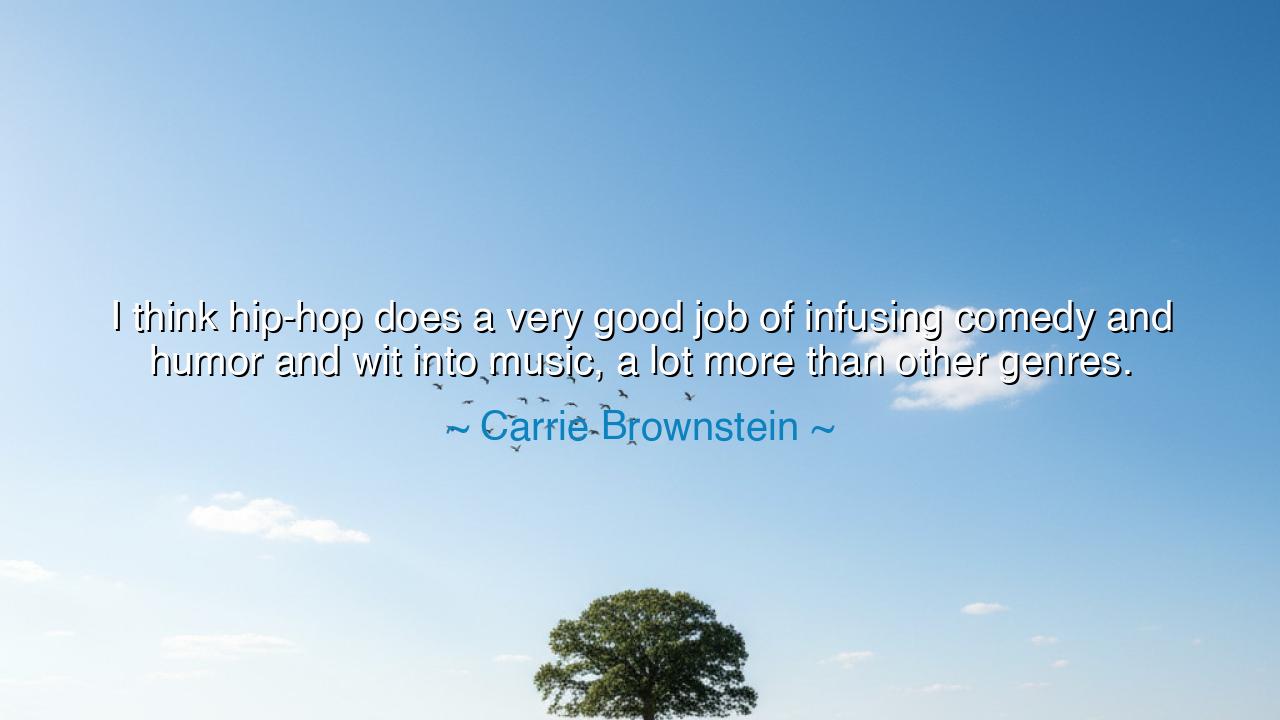
I think hip-hop does a very good job of infusing comedy and humor
I think hip-hop does a very good job of infusing comedy and humor and wit into music, a lot more than other genres.






When Carrie Brownstein declared, “I think hip-hop does a very good job of infusing comedy and humor and wit into music, a lot more than other genres,” she was not merely observing a style of art — she was naming a form of truth-telling that sings from the heart of human experience. Her words reveal the sacred power of humor and wit as instruments of survival, rebellion, and beauty within a world that often silences pain. Hip-hop, born from struggle and born of streets, carries in its rhythm both the cry and the laughter of a people who have learned to turn hardship into art. In that laughter lies a deeper wisdom — that joy and humor are not weaknesses, but shields against despair, and weapons sharper than anger itself.
The ancients, too, understood this holy paradox: that laughter and resistance are kin. In the old days, the jesters of the courts could say what even kings feared to hear. They cloaked truth in humor, revealing corruption under the guise of jokes. So too, the poets of hip-hop — from the furious honesty of Tupac Shakur to the playful genius of The Sugarhill Gang, from Kanye West’s satire to Nicki Minaj’s theatrical wit — use humor not as escape, but as revelation. When Brownstein speaks of hip-hop’s mastery of wit, she recognizes it as the modern heir to that ancient lineage — a form of storytelling that uses laughter to open hearts, rhythm to awaken minds, and irony to unmask power.
For humor, when placed in the hands of truth, becomes alchemy. The hip-hop artist laughs not to mock, but to transform. A clever rhyme about poverty, a witty jab at fame, or a comic twist about love — these are not frivolities; they are acts of balance. Through humor, the artist survives the weight of oppression. Through laughter, they reassert control over their own narrative. This is why hip-hop stands apart, as Brownstein observed — because its humor is not separate from its soul. It is the defiant grin of the survivor, the smirk that says, “You may have tried to silence me, but here I am — rhyming, laughing, living.”
History, too, is full of voices that echo this same truth. In the slave songs of the American South, humor and coded laughter hid messages of rebellion. In the jazz clubs of Harlem, witty banter danced between solos as men and women laughed their way through adversity. Even in the hardest days, people have always used laughter to claim their humanity. Hip-hop inherited this ancestral rhythm — the rhythm of endurance — and dressed it in the beats of the modern age. When rappers jest about fame, wealth, or politics, they are doing more than entertaining; they are holding a mirror to the world and daring it to see itself clearly.
Carrie Brownstein herself, as a musician and storyteller, understands that humor is a form of connection — a bridge between artist and listener, between despair and delight. In hip-hop, that connection runs deeper, for the genre emerged from voices once unheard, from corners where silence was survival. By infusing wit into pain, hip-hop artists invite us not only to listen but to feel — to recognize that laughter can coexist with tears. The wise among us know this: humor is not the absence of seriousness; it is its companion. Only those who have suffered deeply know how to laugh with such fullness.
And yet, there is also discipline in this kind of humor. As in all sacred arts, it requires balance — the poet must know when to jest and when to strike truth raw. In hip-hop, the dance between humor and gravity is constant: one verse may make you laugh, the next may make you weep. It is this balance, this mastery of tone, that makes the genre alive and enduring. Brownstein’s insight honors that complexity — she sees that within the rhythm of hip-hop lies a kind of philosophical elegance, where wit becomes wisdom, and the laugh becomes a form of resilience.
So, what lesson shall we draw from her words? It is this: embrace humor as a language of strength. In your struggles, let wit lighten your burdens without blinding you to truth. In your victories, let laughter humble you and connect you to others. Do not despise the comic, for within it hides courage. Learn from hip-hop — to speak honestly, to laugh boldly, and to turn every hardship into rhythm.
For as Brownstein reminds us, humor is not decoration — it is survival. It is how the human spirit sings, even when chained; how it dances, even in grief. To laugh, then, is to live twice — once in pain, and once in triumph. And that, as hip-hop teaches and Brownstein affirms, is the rhythm of freedom itself.






AAdministratorAdministrator
Welcome, honored guests. Please leave a comment, we will respond soon